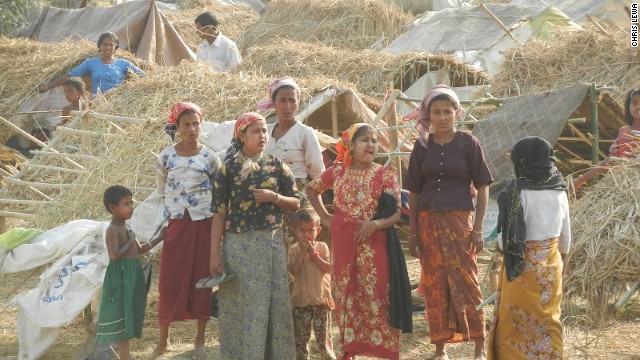
Muslim Rohingya people pictured at a makeshift camp in May this year near Sittwe, the capital of Rakhine state.
STORY HIGHLIGHTS
- Two-child limit placed on Rohingya couples in two predominately Muslim townships
- Comes amid ongoing sectarian violence instigated by Rakhine Buddhists against Rohingya Muslims
- Antagonism towards Islam has lately spiraled into anti-Muslim strife in other parts of Myanmar
- Aung San Suu Kyi: two-child restriction is "discrimination not in line with human rights"
Editor's note: Chris Lewa is founder and director of The Arakan Project,
an NGO engaged for the past 13 years in research-based advocacy on the
situation of the Rohingya people in Rakhine State, their predicament as
refugees in Bangladesh and their migratory movements in the region.
(CNN) -- In May 2013, authorities in Myanmar's
Rakhine state issued a directive placing a two-child limit on Rohingya
couples in two predominately Muslim townships in the region -- in
blatant disregard of the recommendations of a commission set up to
investigate the recent violence between Muslims and Buddhists in western
Myanmar.
As political reforms
slowly took hold in Myanmar following years under the rule of the
military junta, longstanding tensions exploded into sectarian violence
in Rakhine in 2012, instigated by Rakhine Buddhists against Rohingya
Muslims.
Hostility toward the
Rohingya has deep roots, fueled by prejudicial and competing notions of
the role of race and religion in Myanmar's national identity. Successive
regimes and Myanmar society at large perceive the Rohingya as a product
of recent migration and Islamic expansion from overpopulated
Bangladesh. Antagonism towards Islam has lately spiraled into
anti-Muslim strife in other parts of the country.
During military rule, the
Rohingya were subject to a gradual process of marginalization and
exclusion through discriminatory policies and restrictions, particularly
in Northern Rakhine State. Denial of citizenship has legitimized
arbitrary treatment against them and exacerbated hatred.
The two-child policy
emerged from this context and from local orders issued by the NaSaKa and
other local authorities since the early 1990s. The NaSaKa, established
as a border security force in December 1992, was tasked, among other
things, with controlling Rohingya population growth. Restrictions on
movement and regular population checks were imposed to prevent imaginary
infiltrations from Bangladesh, while regulating marriages and family
size aimed at curbing birth rate from within.
In January 1994, the
NaSaKa introduced a local order requiring official permission to marry,
contradicting customary marriage practice. This order later included
penalties for non-compliance. In practice, marriage authorizations can
take up to several years to obtain and are only granted against the
payment of bribes. Infringement such as cohabitation or sexual contact
out of wedlock can result in up to 10 years' imprisonment. Currently,
535 Rohingya men are serving sentences for unauthorized marriages in
Buthidaung Jail, according to research by the Arakan Project. To avoid
prosecution, many young women resort to induced and illegal abortion.
Local orders limiting the
number of children for newly married couples were first issued by
township administrations in Maungdaw and Buthidaung in April 2005. They
imposed stringent conditions for applying for marriage permission and
added that "Those permitted to marry according to this Order should
control the birth rate and limit the number of children for livelihood
sufficiency." The number of children was not specified. However, the
limitation was enforced when newly-married couples were asked to sign a
declaration. Initially, the pledge was no more than three children,
reduced to two children in 2007.
Consequently, Rohingya
women giving birth to a third child are unable to register the newborn
and could be prosecuted under Section 188 of the Penal Code for
disobeying orders from a civil servant, which carries a prison sentence
of up to 6 months. Most often, they become victims of never-ending
extortion by local authorities.
The Rakhine
Investigation Commission estimated that 60,000 Rohingya children are
currently unregistered, born out of unauthorized as well as authorized
marriages. Some parents are too poor to cover travel expenses and bribes
for birth registration, or experience administrative hurdles. An absent
father precludes the mother from registering her baby, or the newborn
is above the permissible number of births.
Unregistered children
are not recorded in the family list as they do not exist
administratively. They will not be issued with a temporary ID card and
will thus be unable to attend school, to apply for travel permits or
ultimately to marry.
The Commission report
cites high birth rates among Rohingya as a key factor of insecurity
among Rakhine. It recommends family planning education to mitigate these
concerns but stresses that authorities should refrain from implementing
forcible birth control measures.
Lack of awareness but
also poor access to family planning is prevalent, particularly in rural
areas where reproductive health services are often unavailable.
Elsewhere, a growing number of Rohingya families have actually adopted
birth spacing methods.
This Rakhine State
Government directive also violates Myanmar's international obligations
under the Convention for the Elimination of Discrimination against Women
and the Convention on the Rights of the Child.
In a speech on May 6,
President Thein Sein pledged that his government would ensure the basic
rights of Muslims in Rakhine State, enforce the rule of law and "provide
genuine and decisive leadership in resolving the conflict." Leading
pro-democracy activist and lawmaker Aung San Suu Kyi also condemned the two-child restriction on Rohingya couples as "discrimination not in line with human rights."
Following international
outrage, Ye Htut, the President's spokesperson, timidly responded that
the government is re-examining this order.
Thein Sein's words must
urgently be translated into action and he should immediately repeal the
two-child policy and other discriminatory orders against the Rohingya.
If left unchallenged, more directives will be issued that could trigger
renewed violence.

No comments:
Post a Comment